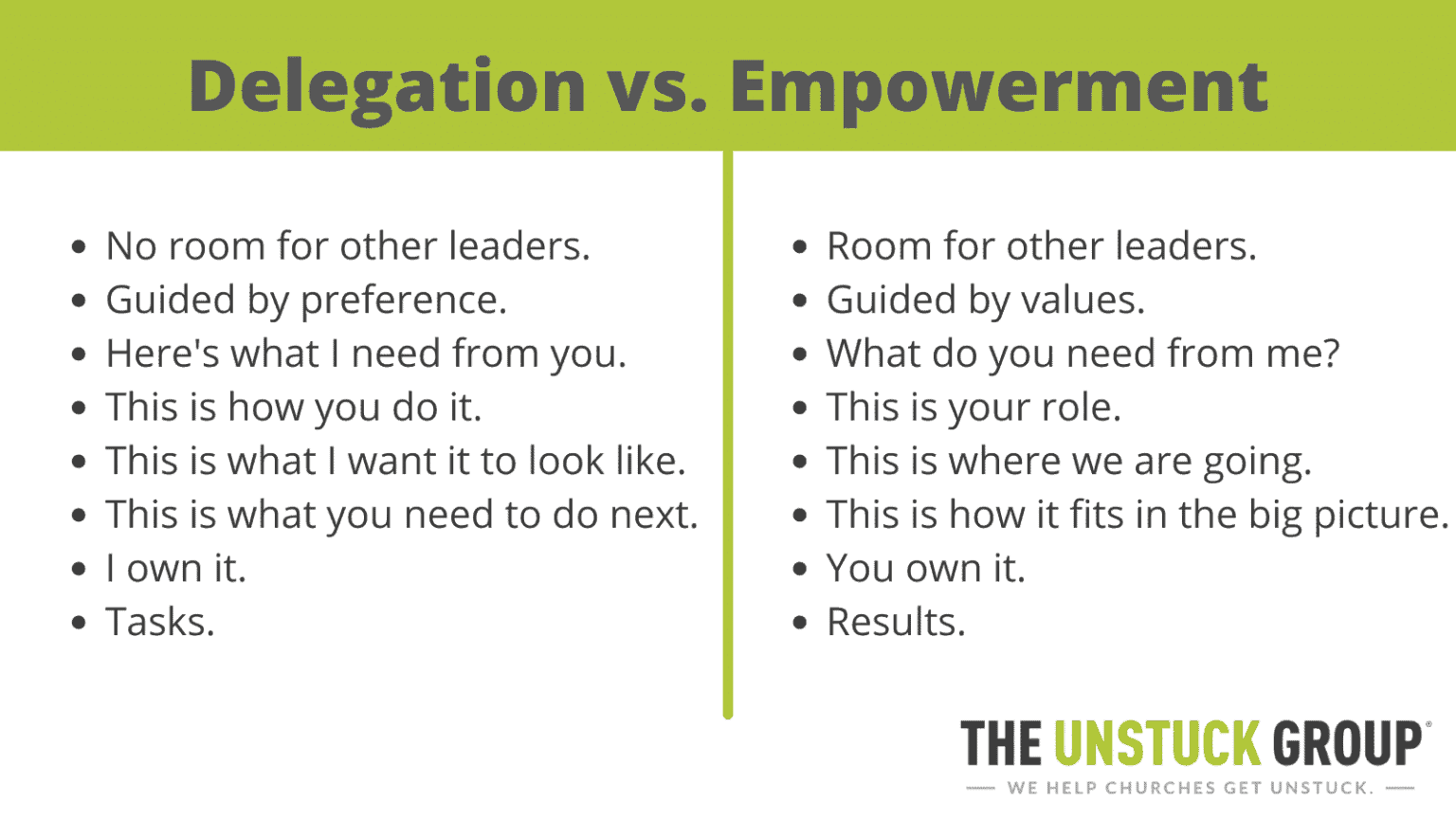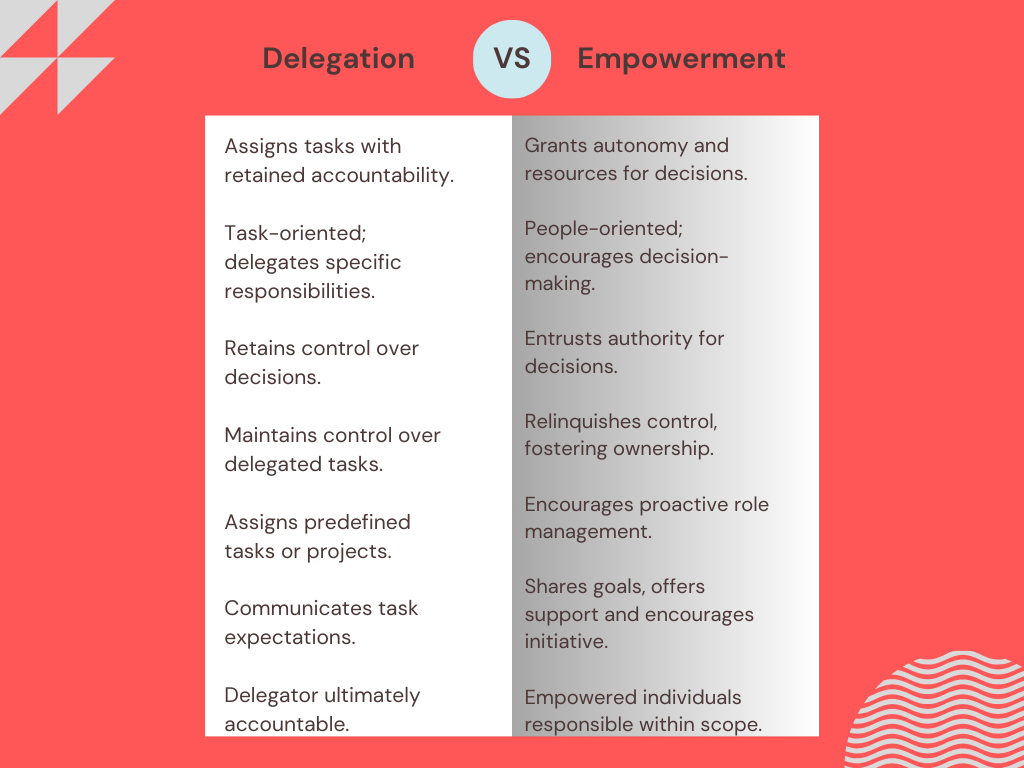Delegation and Empowerment: Unlocking Team Potential
In today’s fast-paced business environment, the ability to delegate effectively and empower employees is crucial for leaders aiming to enhance productivity, foster innovation, and develop future leaders within their organizations. Delegation is not just about handing off tasks; it’s about creating a culture where team members feel valued and trusted to contribute to the organization’s success. This article explores the concepts of delegation and empowerment, their importance in leadership, and strategies for implementing them effectively.

Understanding Delegation and Empowerment
What is Delegation?
Delegation refers to the process of assigning responsibility and authority to others to carry out specific activities. It involves entrusting tasks to team members based on their skills, expertise, and potential. Effective delegation not only helps in accomplishing tasks but also enhances team performance and morale.
Key Benefits of Delegation:
– Increased Efficiency: By distributing tasks, leaders can focus on higher-level responsibilities.
– Skill Development: Delegation provides team members with opportunities to develop new skills and grow in their roles.
– Enhanced Collaboration: Working together on delegated tasks encourages teamwork and fosters a collaborative environment.
What is Empowerment?
Empowerment is the process of giving employees the authority, resources, and confidence to make decisions and take ownership of their work. It encourages individuals to utilize their skills and creativity to solve problems and contribute to the organization’s objectives.
Core Aspects of Empowerment:
– Trust: Empowerment is rooted in trust, where leaders believe in their team members’ capabilities.
– Autonomy: Employees are given the freedom to make decisions, fostering a sense of ownership.
– Support: Leaders provide the necessary resources and guidance to help employees succeed.
The Relationship Between Delegation and Empowerment
Delegation and empowerment are closely intertwined. Effective delegation can lead to empowerment as it allows employees to take on responsibilities and make decisions. When leaders delegate tasks, they not only distribute workload but also demonstrate trust in their team members’ abilities. This trust encourages employees to take initiative and become more engaged in their roles, ultimately contributing to a more dynamic and innovative workplace.
The Importance of Delegation in Leadership
Enhancing Team Productivity
One of the most significant benefits of delegation is its impact on team productivity. When leaders delegate tasks effectively, they enable their teams to work more efficiently, allowing for faster project completion and higher-quality outcomes. By focusing on their core responsibilities, leaders can drive the team toward achieving its goals more effectively.
Developing Future Leaders
Delegation plays a vital role in developing future leaders within an organization. By assigning tasks to team members, leaders provide them with valuable experiences that prepare them for more significant roles in the future. This process not only helps identify potential leaders but also ensures a pipeline of talent ready to step up when needed.
Reducing Burnout for Leaders
Leaders often face overwhelming workloads, leading to stress and burnout. By delegating tasks, leaders can alleviate some of this pressure, allowing them to focus on strategic planning and decision-making. This balance is crucial for sustaining long-term effectiveness and well-being as a leader.

Strategies for Effective Delegation
Identify Tasks Suitable for Delegation
Not all tasks are suitable for delegation. Leaders should assess their workload and identify tasks that can be handed off without compromising quality or performance. Criteria for delegation may include:
– Repetitive Tasks: Routine tasks that do not require specialized skills.
– Low-Priority Tasks: Activities that do not require the leader’s immediate attention.
– Developmental Opportunities: Tasks that can help team members grow and learn.
Match Tasks to Team Members’ Skills
Once suitable tasks are identified, leaders should match them to team members based on their skills and strengths. Understanding each employee’s capabilities allows for better task allocation, enhancing both productivity and job satisfaction.
Provide Clear Instructions and Expectations
Clear communication is essential for successful delegation. Leaders should provide detailed instructions, outline expectations, and set deadlines to ensure team members understand their responsibilities. This clarity helps prevent misunderstandings and sets everyone up for success.
Establish Accountability and Follow-Up
Delegation does not end with assigning tasks. Leaders must establish accountability by setting up regular check-ins and follow-ups. This practice ensures that team members feel supported and can address any challenges they encounter.
Empowering Employees Through Delegation
Building Trust and Confidence
Delegation builds trust between leaders and team members. When leaders demonstrate confidence in their employees’ abilities, it encourages them to take initiative and explore new ideas. This trust fosters a positive working environment and motivates employees to contribute more effectively.
Encouraging Decision-Making
Empowerment encourages employees to make decisions within their roles. When team members feel they have the authority to act, they are more likely to take ownership of their tasks, leading to increased innovation and a proactive approach to problem-solving.
Recognizing and Rewarding Initiative
Recognizing and rewarding employees for their contributions is essential for fostering empowerment. Leaders should celebrate successes and acknowledge initiative, reinforcing the behavior they want to see within the team. This recognition can take various forms, such as verbal praise, formal awards, or opportunities for professional development.

Common Challenges in Delegation and Empowerment
Overcoming Fear of Losing Control
One of the primary barriers to effective delegation is the fear of losing control. Leaders may hesitate to delegate tasks, worrying that they won’t meet their standards. Overcoming this fear involves building trust in team members’ capabilities and recognizing that delegation is an investment in the team’s growth.
Managing Team Dynamics
Delegation can sometimes lead to challenges in team dynamics, especially if not everyone agrees with the distribution of tasks. Leaders must be attentive to team interactions and address any conflicts that arise. Open communication and collaboration are vital for maintaining a harmonious team environment.
Addressing Skill Gaps
Skill gaps among team members can pose a challenge in the delegation process. Leaders should assess their team’s skills regularly and provide training or resources as needed. Addressing these gaps ensures that all team members are equipped to handle delegated tasks successfully.
In the next section, we will explore strategies for measuring the impact of delegation and empowerment on team performance and overall organizational success. Stay tuned for insights on how to implement these practices effectively and create a thriving workplace culture.
Measuring the Impact of Delegation and Empowerment
Key Performance Indicators (KPIs)
To evaluate the effectiveness of delegation and empowerment within a team, it’s essential to establish Key Performance Indicators (KPIs). These metrics can help leaders assess whether their efforts to delegate and empower employees are yielding positive results. Some useful KPIs include:
- Employee Satisfaction Scores: Regular surveys can gauge team members’ feelings of empowerment and job satisfaction.
- Task Completion Rates: Tracking the timely completion of delegated tasks can provide insights into the effectiveness of delegation.
- Team Productivity Metrics: Monitoring overall team performance, such as project completion rates and quality of work, helps measure the impact of empowered employees.
Collecting Feedback
Regular feedback from team members is crucial in understanding how delegation and empowerment are perceived. Encourage an open-door policy where employees can share their thoughts on delegation processes and their empowerment experiences. This feedback can highlight areas for improvement and reinforce positive practices.
- One-on-One Meetings: Schedule regular check-ins with team members to discuss their progress and gather insights.
- Anonymous Surveys: Utilize anonymous surveys to create a safe space for employees to express their opinions honestly.
Celebrating Successes
Recognizing and celebrating achievements related to delegation and empowerment can reinforce positive behaviors. This not only motivates employees but also creates a culture of appreciation.
- Public Recognition: Highlight team members’ accomplishments during team meetings or through internal newsletters.
- Reward Systems: Implement reward programs that recognize employees who demonstrate initiative and leadership in their delegated tasks.

FAQs about Delegation and Empowerment
1. What are the common mistakes leaders make when delegating tasks?
Common mistakes include failing to provide clear instructions, not matching tasks with the right team members, and micromanaging after delegation. Leaders should focus on clarity, trust, and allowing autonomy.
2. How can I encourage my team to take ownership of their tasks?
Foster a culture of accountability by setting clear expectations and providing the necessary resources. Encourage team members to set their own goals and celebrate their achievements, reinforcing their sense of ownership.
3. What role does communication play in delegation and empowerment?
Effective communication is crucial for successful delegation and empowerment. It ensures that team members understand their responsibilities and feel supported in their roles. Regular updates and feedback also help maintain transparency and trust.
4. How do I handle situations where delegated tasks are not completed satisfactorily?
Address the issue promptly by discussing it directly with the team member involved. Understand the challenges they faced and provide guidance or additional resources to help them improve. Encourage learning from mistakes rather than assigning blame.
5. Can delegation and empowerment work in remote teams?
Absolutely! Delegation and empowerment can be very effective in remote teams. Utilizing digital tools for communication and project management helps maintain transparency and collaboration, even from a distance.
Conclusion
Effective delegation and empowerment are vital for leaders aiming to build high-performing teams. By fostering a culture that values trust, autonomy, and skill development, leaders can unlock the full potential of their team members. The benefits of delegation and empowerment extend beyond immediate productivity gains; they create an engaged workforce ready to tackle challenges and drive innovation.
Incorporating these practices not only enhances team performance but also cultivates future leaders who will contribute to the long-term success of the organization. By embracing delegation and empowerment, leaders set the foundation for a thriving, collaborative, and dynamic work environment.

For further reading on effective leadership strategies, check out our articles on Leadership Styles and Building Trust in Teams. Embrace the power of delegation and empowerment, and watch your team soar!

